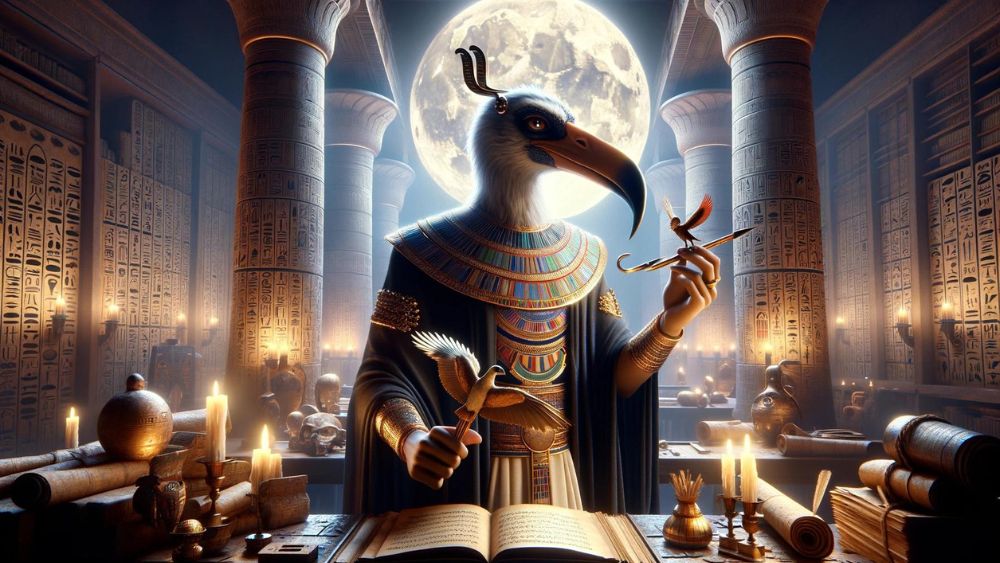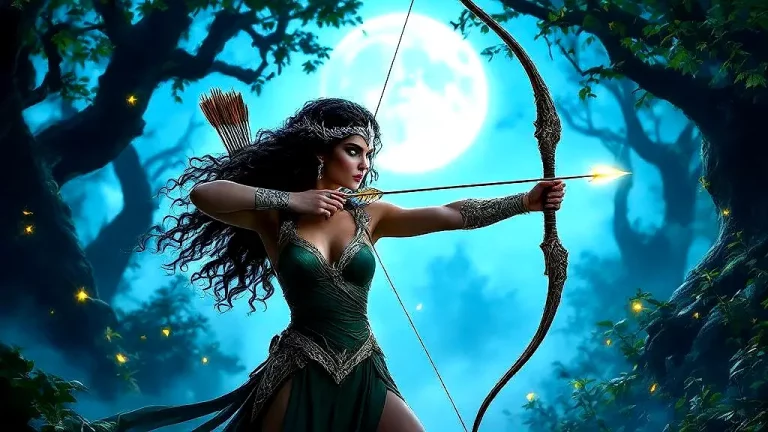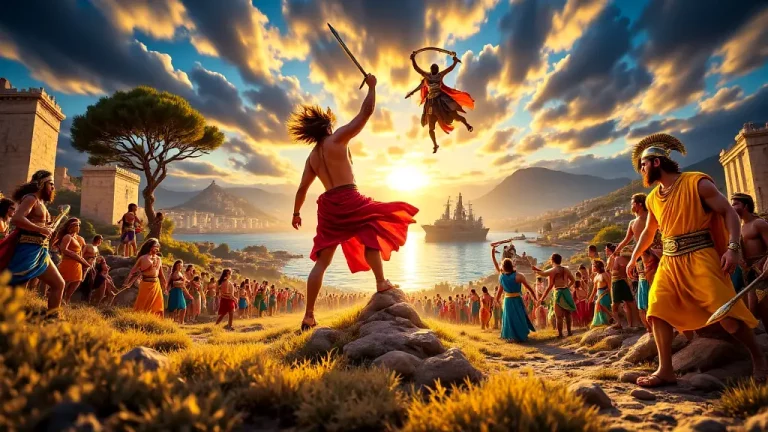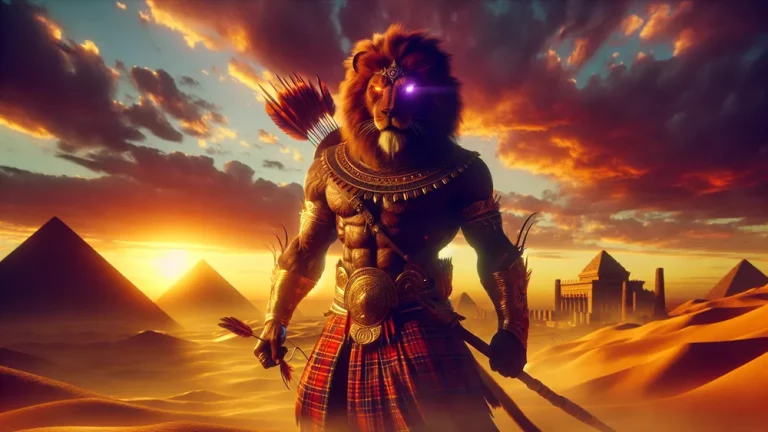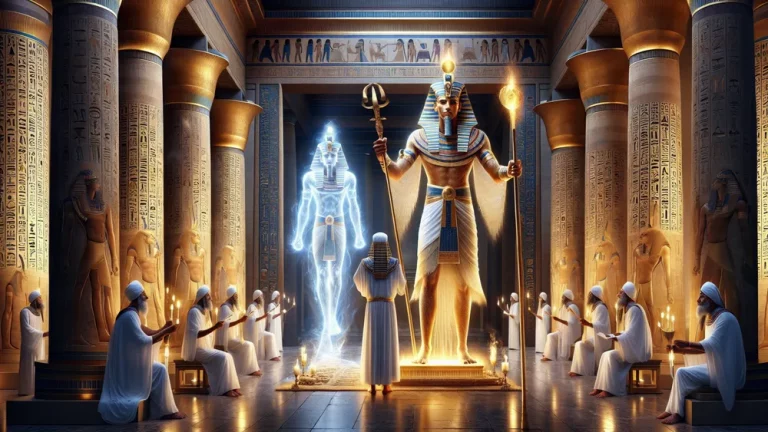Thoth: Ancient Egyptian Deity Of Wisdom And Moon
The ancient Egyptian world is famous for its deep myths and many gods and goddesses. Each one had a special job in the lives of the people and in their beliefs. Thoth, the god of wisdom, writing, and the moon, is especially important. He touches many parts of Egyptian culture, from stories and beliefs to art and learning.
Key Points:
- Thoth was an ancient Egyptian deity known for wisdom, writing, and the moon.
- He played a crucial role in Egyptian culture, especially in writing and maintaining balance.
- Thoth’s symbols included the ibis and baboon, representing wisdom and knowledge.
- His legacy includes the creation of hieroglyphics and supporting writers.
- Thoth’s influence is still seen in modern culture through books, movies, and online content.
- He was respected for his role in afterlife beliefs and for settling disputes between gods.
- Thoth’s temples and writings show his significance in ancient Egyptian mythology and religion.
This makes him very interesting and key to understand. Looking into who Thoth was, what he meant, and what he left behind gives us a full view of his big role in ancient Egyptian history and how it still matters today.
Who is Thoth and Why Does He Matter?
To really get the big idea of Thoth’s huge role in ancient Egypt, we need to look closely at who he was and why he was so key in the lineup of Egyptian gods.
The Identity and Significance of Thoth in Ancient Egyptian Culture
Thoth plays a huge role in Egyptian culture. He’s all about wisdom, writing, and the moon. People in ancient Egypt looked up to him a lot because he was so smart and powerful. He wasn’t like any regular god; he had a special job to keep everything in order and make sure the universe ran smoothly.
This made him super crucial for how society worked and how people understood the world around them. Thoth did so much for Egyptian mythology and culture, especially when it came to writing and making sure laws were fair. Talking about how much Thoth mattered in ancient Egypt is really interesting.
He came up with hieroglyphics (more on that later), which was a huge game-changer for how Egyptians kept records, did their religious rituals, and talked about all sorts of ideas. This invention put Thoth right at the center of Egyptian life when it came to learning and sharing knowledge.
Also, because he was linked to the moon, he had a say in how time worked and how people planned their calendars and farming. It’s pretty clear that Thoth was a key player in so many parts of Egyptian life.
- Thoth was known for settling arguments between gods which showed he was all about fairness and balance.
- People looked up to him for help with the afterlife, which was a major part of Egyptian beliefs.
- Places dedicated to Thoth, like temples and libraries, were where people went to learn and keep the culture alive.
Thoth’s significance in ancient Egyptian culture was immense, particularly in areas of wisdom, writing, and maintaining order, which influenced various aspects of society and knowledge-sharing.
Symbols and Representations of Thoth
When we talk about Thoth, two animals often come up: the ibis and baboon. These creatures mean a lot when it comes to Thoth. The ibis, for example, has a long, curved beak which people back then linked to wisdom and the act of writing. This makes sense because Thoth is all about knowledge and writing.
On the other hand, the baboon is another symbol for Thoth because it was seen soaking up the sun while looking like it was praying. This image made people think of Thoth as a god of the moon and someone who loves learning and praying. Aside from animals, there are objects that remind us of Thoth’s love for writing and knowledge.
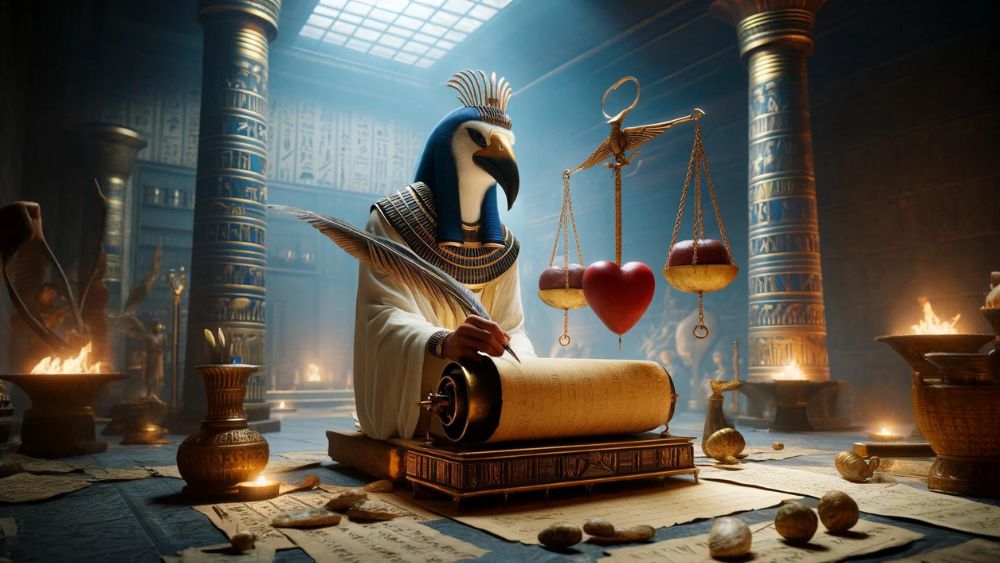
Things like writing palettes and scrolls were very common when picturing Thoth. These items were essential for anyone who wrote for a living back in those days. They show us how much Thoth was involved in creating and keeping knowledge alive. Everywhere in ancient Egyptian art and religion, these symbols popped up. They helped everyone remember how crucial Thoth was to their culture and their spiritual life.
- The ibis often appears standing on a standard or in scenes that focus on writing and learning.
- Baboons may be shown sitting down, looking like they are in the middle of worship or paying close attention, which ties them to Thoth.
- Writing palettes and scrolls are found in the resting places of those who wrote for a living, which links Thoth directly to writing and the afterlife.
Thoth’s Influence and Legacy
After getting to know who Thoth is and what he represents, let’s shift our focus to how he left a mark on the stories and beliefs of ancient Egypt.
Thoth’s Role in Egyptian Mythology and Religion
In ancient Egypt, Thoth had a very important job when it came to what happened after people died. He was part of the weigh of the heart ceremony. This was when they decided if someone had lived a good life and could go to the afterlife. They did this by comparing the person’s heart to a feather that stood for truth and fairness.
Thoth’s job was to write down the results. This showed how crucial he was in keeping everything in balance, which the Egyptians thought was very important for the universe. Thoth also had a special relationship with other gods. He was like the voice for Ra, the sun god, which meant he helped communicate Ra’s messages to other gods.
This made Thoth very central in the stories about how the world was made and kept going. He was known for being very wise and for his skills in magic which made him very powerful and respected. People all over Egypt worshipped Thoth. They built big temples for him in places like Hermopolis.
These temples were where a lot of learning and writing happened because Thoth was the god of wisdom and writing. The people who worked at these temples did many rituals to show their respect for Thoth and his qualities of wisdom and fairness. The way these temples were run and the respect people had for Thoth show how important he was in both their religious beliefs and their everyday lives.
Thoth and the Written Word
Thoth stood out for his huge role in writing and knowledge. He came up with hieroglyphics. This system was key for how ancient Egyptians shared and kept records. Thoth was very close to those who wrote for a living and those who loved learning. Hieroglyphics were special because they mixed pictures and symbols to capture both everyday and sacred Egyptian life. Thoth’s work here was very, very crucial.
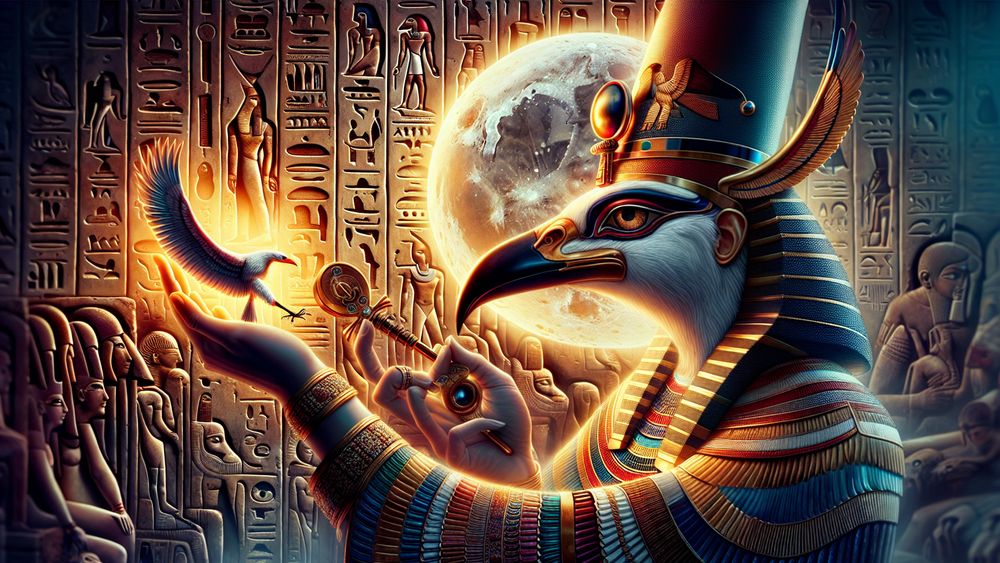
He was seen as the top authority on knowledge and how to write it down. This was vital for keeping society in order and peaceful. Writing and keeping records were super important in ancient Egyptian life, and Thoth was at the heart of it all. People looked up to him for anything that had to do with writing.
This skill was highly respected and absolutely necessary for running the government, for religious practices, and for the culture overall. Thoth being so central showed how much value was placed on being able to read and write and on keeping knowledge safe. His link to writing helped Egyptian civilization grow strong, making sure that history, laws, and stories could be shared and remembered for a long time.
| God | Where They’re From | What They’re Known For | How They Help With Writing |
|---|---|---|---|
| Thoth | Egypt | Being wise, writing, and the moon | Created hieroglyphics, supported writers |
| Athena | Greece | Being smart and good in battle | Help start the alphabet |
| Odin | Norse lands | Being wise and magical | Found runes for writing |
Thoth’s creation of hieroglyphics was crucial for preserving knowledge and maintaining order in ancient Egyptian society.
The Legacy of Thoth in Modern Times
Today, Thoth still grabs our attention but in new ways. Books, movies, and online content bring him into the modern world. They often focus on his wisdom and knowledge. This makes him popular in stories where magic and history mix. People love to learn about Thoth because he is a part of Egyptian history and myths.
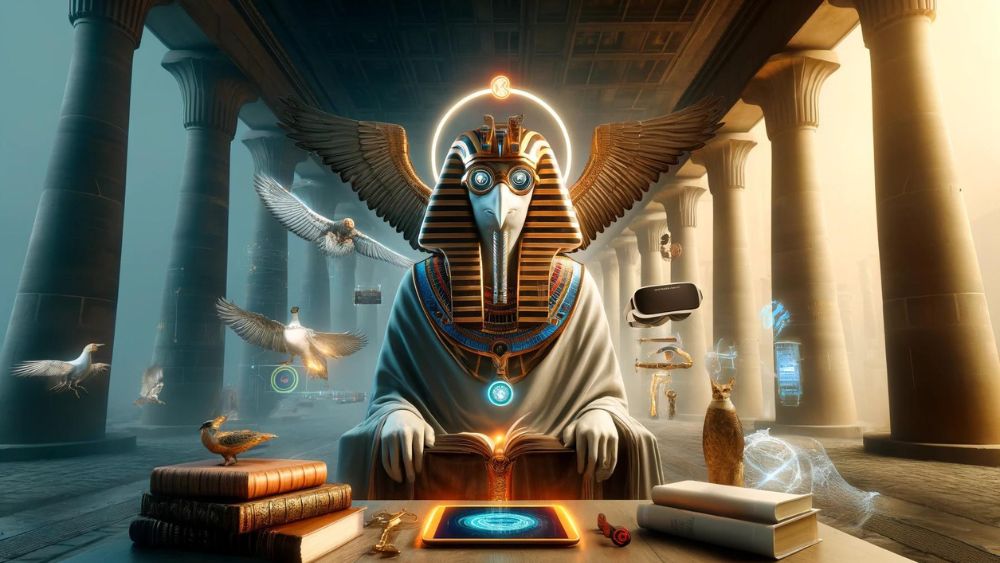
This interest helps experts and fans find out more about him and his time. Experts digging up old temples for Thoth have found lots of useful info. These places, like the one at Hermopolis, tell us how people back then showed their respect and love for Thoth. We learn about the buildings and art from those times and how much Thoth meant in the Egyptian gods’ world.
Also, looking at old objects and writings helps us understand how Thoth influenced writing and learning in ancient Egypt.
The Pantheon of All the Egyptian Mythology Gods
The wide range of Egyptian gods forms a rich and varied group. These gods and goddesses play key roles that touch every part of life and the universe for ancient Egyptians. They cover everything from how the world began to the finer points of human experiences like love and justice. For those wanting to dive into the details about each god and their stories, a comprehensive guide is available.
It’s a great starting point for anyone keen on getting to grips with the many faces and tales of Egyptian mythology and its impact on how this civilization saw the world and themselves.
FAQs
1. Who was Thoth and what was his role in ancient Egyptian mythology?
In the world of ancient Egypt, Thoth stood out. He was the god who knew a lot about wisdom, writing, and the moon. His job in the myths that Egyptians told was very important. He worked as a go-between for the gods and kept track of their decisions and actions.
2. How was Thoth typically represented in ancient Egyptian art and symbols?
When you look at ancient Egyptian art and symbols, you’ll often see Thoth shown as either an ibis or a baboon. These animals were very special to him and helped people recognize which god they were looking at. Besides these animals, Thoth is almost always seen with a writing palette and scrolls in his hands.
This is because he was the god of wisdom and writing. These items were his tools, and they showed everyone that he was in charge of knowledge and keeping records.
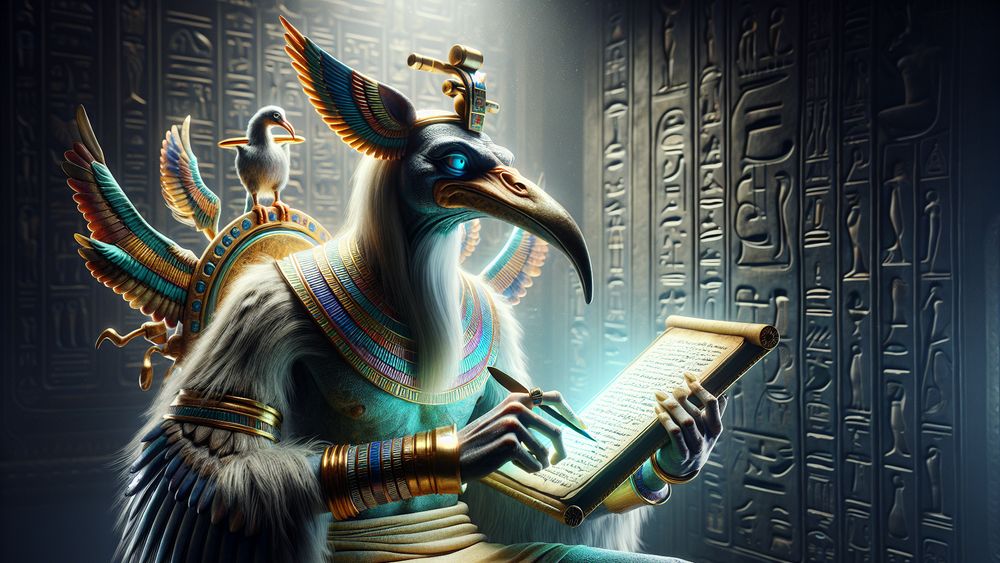
3. What are some of the most famous myths and stories involving Thoth?
In the tales that have passed down through ages, Thoth plays a key role when he steps in to settle the fight between Horus and Seth. It’s a story where his wisdom and fairness shine. Another tale that catches many ears is about how Thoth brought writing into the world. He didn’t keep this skill for the gods but shared it with people, changing their lives forever.
4. How has Thoth’s legacy influenced modern culture and our knowledge of ancient Egypt?
The impact of Thoth on today’s world and our grip on ancient Egypt is quite strong. He brings a lot to modern stories and studies about the past with his signs and wisdom. This helps us get a fuller and more detailed view of Egypt’s myths and history.

